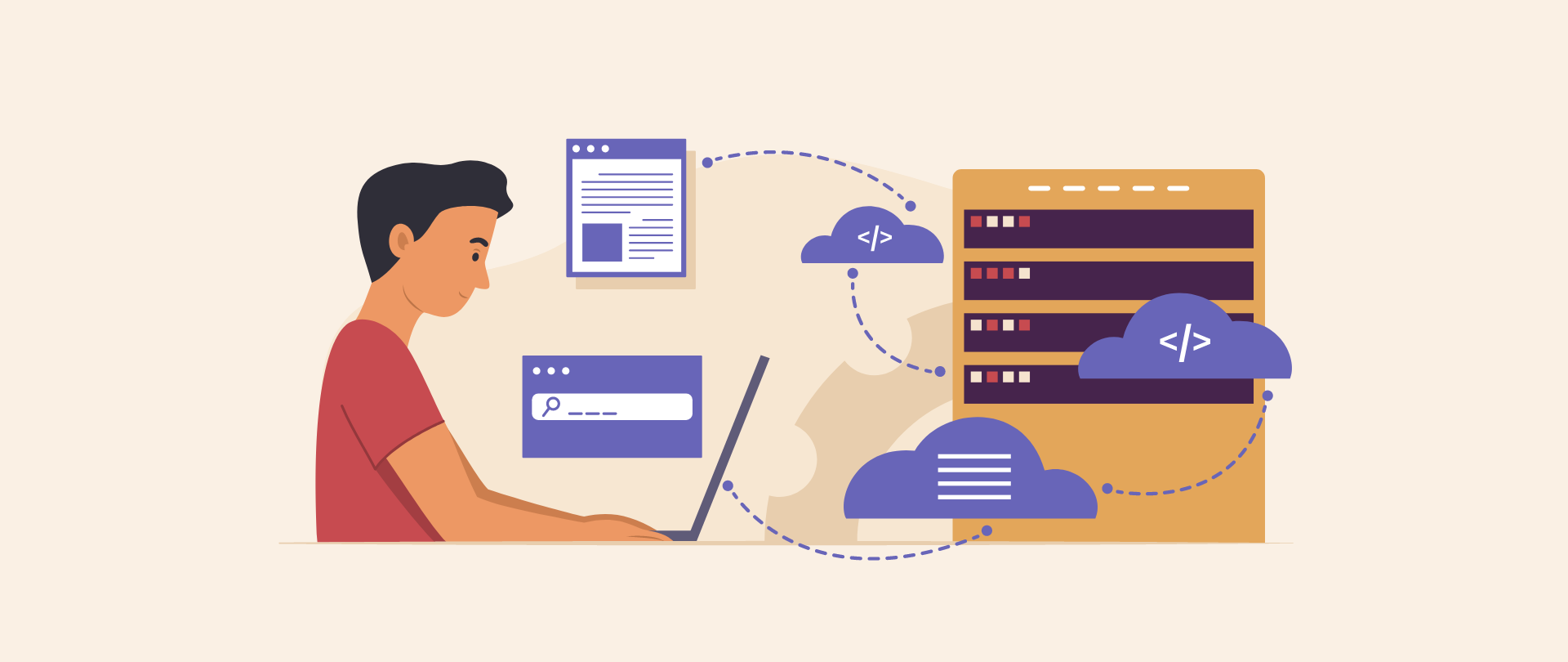Published by Muskan Taneja on Mar 2, 2023
Benefits Of Cloud Computing In The eCommerce World
In the evolving nature of where and how information and applications are accessible, mobile devices and cloud computing are becoming increasingly dominant. In the early days computers, software, and operating systems were merged into a single interface, enabling simple communication via tools like email. The simultaneous introduction of smartphones and cloud computing has now surpassed the transition from a mainframe to a personal computer. The fundamental makeup of computers has changed with each phase, becoming increasingly scattered. This will significantly impact how customers, suppliers, and vendors interact.
In this blog, you will learn about cloud computing, its benefits in the eCommerce world, and its implementation.
What is Cloud Computing?
The new technology that offers hosting services is called cloud computing. It entails using the Internet to store and access data and software instead of your computer's hard drive. It alludes to the contract-based outsourcing of data centers and application services to a distant vendor. It refers to network-based computing that occurs over the Internet. It represents a progression from Utility Computing. It is a set or collection of networked, integrated hardware, software, and Internet infrastructure. Clients who use the Internet for communication and transportation can access networking, hardware, and software services. By offering a relatively straightforward graphical interface or API, these platforms shield users and applications from the complexity and details of the underlying infrastructure.
Various Cloud-Based Business Models

Depending on the services your company needs, there are various cloud-based business models.
1. Infrastructure as a Service(IaaS)
IaaS providers of cloud services offer virtualization, networking, hosting, and storage. It lessens the need to create and manage internal infrastructure.
2. Platform as a Service(PaaS)
Customers can build, test, and deploy applications on the service provider's platform. The best feature of employing this model is the ready-made tools that speed up development.
3. Software as a Service(SaaS)
Customers of cloud service providers have access to tools for data management and service on demand. Instead of installing the software on the device, it enables customers to utilize it online.
Benefits Of Cloud Computing In The eCommerce World
Let's go over the significant advantages of cloud computing in eCommerce:

1. Reduction In Costs
IT costs are reduced through cloud computing. Stores can use the money for other requirements instead of purchasing equipment, which is essential for rapidly expanding stores. Due to the inconvenience and high cost of purchasing new equipment, cloud computing allows for speedy resource expansion. Large data centers also use a lot of space and electricity. As a result, cloud computing in eCommerce helps eCommerce stores to pay less for electricity and free up more space.
Additionally, cloud solutions enable labor and maintenance cost savings. Hence, IT workers can devote the time saved to other crucial development components. Employees can gain from cloud-based technologies that are made to organize and safely keep business data and cash, such as video conferencing services and accounting software. All of these things increase labor productivity.
2. Faster Deployments
One of the major benefits of adopting the cloud is the ability to deploy new features and changes to your website considerably faster than hosting everything on your servers. You don't need to be concerned about maintaining and configuring your infrastructure. You can instead concentrate on creating your website and providing new features that will make your consumers' experience better.
3. Scalability
Businesses can scale up or down using cloud services based on website traffic, seasonal variations, and other business challenges. It offers e-commerce companies a scalable architecture based on the state of the industry. No additional hardware purchases or hiring of staff is required for maintenance services.
Any resource could be obtained as needed by using cloud computing services. It makes it possible to add resources to accounts quickly and remove them. Due to this practical solution, you won't have to be concerned about running out of storage or about clients being unable to access your internet business.
4. Security
Approaches that are used by cloud providers are very safe and efficient. The main concern facing the e-commerce sector is security. However, cloud technology has created a very advanced and secure method for the administration of data. Security professionals that work for cloud service companies oversee the security feature of cloud apps. These experts have greater experience than your company's typical IT employees. Therefore, using cloud-based technology to manage data is more reliable than doing so manually.
5. Infrastructure Support
The largest problem facing the e-Commerce sector is data storage. Analyzing data is crucial in e-commerce to comprehend customer needs. Every day, millions of users conduct numerous searches. Finding the user's trends and interest is a challenging process. Modern data analysis methods and cloud computing can quickly resolve this issue. Numerous data mining firms are utilizing this strategy and offering their services to major e-commerce firms.
E-commerce businesses no longer have to spend a significant amount of money on infrastructure. They can use cloud service providers' services and save a tonne of money.
6. Restoration Backups
The majority of operations in the e-commerce sector rely on servers. If servers function poorly, business actions are impacted and suffer losses. Power outages, unforeseen issues, or physical damage to the workplace can cause data loss and significant financial loss. However, if you use cloud-based technology, you may unwind knowing that your data is secure there. You are free to do business as usual.
Key Planning For Successful Cloud Implementation
We've created a 5-step manual after performing hundreds of migrations of cloud computing in eCommerce apps for our clients to assist guarantee success.
1. Evaluation
When assessing cloud choices, be sure to compile a thorough list of what you require, why you are considering a change, when the change should occur, and the variables determining a project's success. Make sure you know where and why you want to make any IT changes before you start so that you can get there effectively.
2. Vendor Selection
The larger the project and the more critical the new cloud system will be to your business, the more important it is that you pick the right vendor. Cloud services are frequently offered by one provider and backed by another. Make sure you are familiar with all the parties and have a working connection with your vendor, including not only the salespeople but also the support staff.
3. Connectivity
The more information you store in the cloud, the more crucial it is to have an online connection. A strong connection with low latency and no congestion is necessary for any cloud service that involves real-time data delivery. The best option is frequently dedicated bandwidth, which is well worth the slight price premium. Furthermore, there is never a guarantee that internet connections will be restored because they can go down for various reasons. Make sure your network is set up for automatic failover and that you have a backup internet line from a different provider if you don't want to lose access to your cloud services.
4. Implementation
Assign a project champion within your organization, confirm the vendor has a project manager on board, and be sure to plan out every aspect of the project, including security, data conversion, proof of concept, and training. Before going live, test everything; do not accept justifications. Once you make the switch, the company's employees will still have work to accomplish and won't have time to wait for the development team to release patches.
5. Support
It is never simple to win over the personnel. Make sure they comprehend what is occurring when it will happen, and why the organization is changing. Assure them of the advantages to them, provide them with a wealth of options for assistance right away following the migration, such as FAQ documents, training videos, and in-person or online training, and let them know who to contact with any issues they may have. Remind them that while the first day or two may be challenging, the adjustment will have positive effects, and you'll make sure they see the light immediately.
Final Thoughts

In a time when technology advances quickly, it is crucial to stay inventive and updated. It's challenging to run a firm with outdated legacy technologies, and Cloud computing in eCommerce is proving to be the ideal painkiller. With the justifications mentioned above for doing business in cloud computing, a company can succeed by hitting its goal. It is now necessary for a firm to adjust to the needs of its clients. You can better understand your users' demands by using cloud computing.
Contact Innow8 Apps for a consultation on cloud-based solutions if you have plans to modernize your online retail platform.
Develop your cloud-based eCommerce solution
Recent Blogs:

Choosing the Best SaaS App Development Partne...
Trust our expert advice to find the top SaaS app development partner in India. Elevate your ...
Read More
A Beginner’s Guide to a Progressive Web App
Uncover the beginner's guide to Progressive Web Apps (PWAs) in our informative blog. Learn h...
Read More
How does DoorDash works? | DoorDash Business ...
Unveiling the success mantra of DoorDash's customer-centric business model in the online foo...
Read More